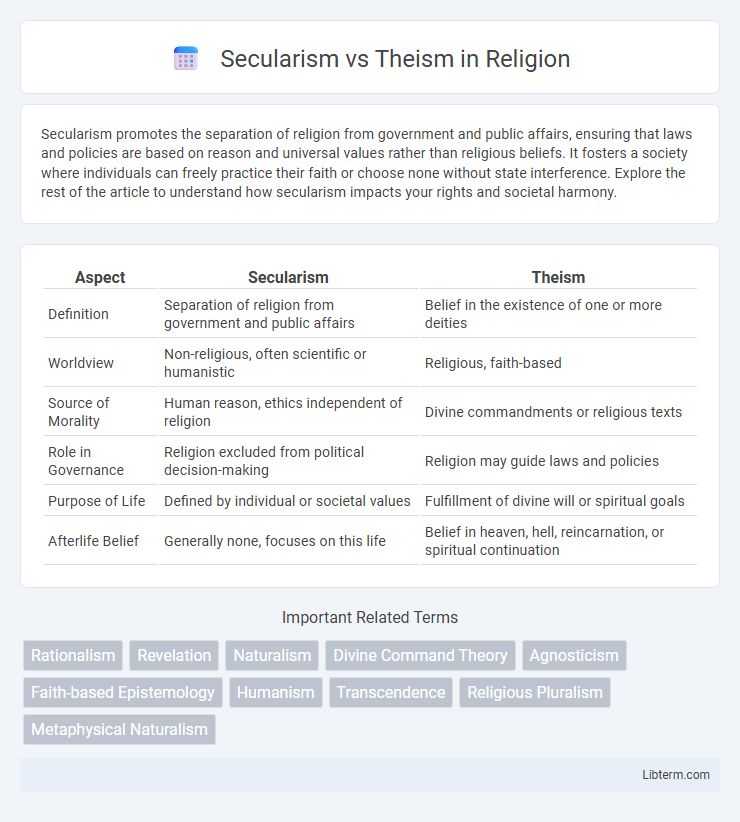Secularism promotes the separation of religion from government and public affairs, ensuring that laws and policies are based on reason and universal values rather than religious beliefs. It fosters a society where individuals can freely practice their faith or choose none without state interference. Explore the rest of the article to understand how secularism impacts your rights and societal harmony.
Table of Comparison
| Aspect | Secularism | Theism |
|---|---|---|
| Definition | Separation of religion from government and public affairs | Belief in the existence of one or more deities |
| Worldview | Non-religious, often scientific or humanistic | Religious, faith-based |
| Source of Morality | Human reason, ethics independent of religion | Divine commandments or religious texts |
| Role in Governance | Religion excluded from political decision-making | Religion may guide laws and policies |
| Purpose of Life | Defined by individual or societal values | Fulfillment of divine will or spiritual goals |
| Afterlife Belief | Generally none, focuses on this life | Belief in heaven, hell, reincarnation, or spiritual continuation |
Defining Secularism and Theism
Secularism is the principle of separating religious institutions and government, promoting a neutral public sphere where no religion is privileged. Theism, by contrast, is the belief in the existence of a deity or deities, often involving worship and adherence to divine authority. Understanding these concepts highlights the fundamental distinction between a worldview grounded in religious faith and one based on secular governance.
Historical Roots of Secularism and Theism
Secularism originated during the Enlightenment era as a response to the dominance of religious authority, emphasizing the separation of church and state to promote individual freedoms and rational governance. Theism, rooted in ancient civilizations, represents belief systems centered on the existence of deities, shaping moral codes and social structures across cultures for millennia. Historical developments like the Scientific Revolution and political reforms significantly advanced secularism, contrasting with the enduring influence of theistic traditions in shaping human history.
Core Principles: Secular vs Theistic Worldviews
Secularism prioritizes human reason, empirical evidence, and separation of religion from state affairs, fostering a neutral public sphere where diverse beliefs coexist without religious dominance. Theism centers on a divine being as the foundation of morality and existence, advocating that religious doctrines guide ethical decisions and governance. These core principles shape contrasting worldviews, influencing cultural, legal, and social norms worldwide.
The Role of Religion in Public Life
Religion shapes public life by influencing moral values, social norms, and political decisions, often guiding legislation and community behavior in theistic societies. Secularism advocates for the separation of religion and state, ensuring government neutrality to accommodate diverse beliefs and prevent religious dominance. The balance between religion's role and secular governance impacts social cohesion, freedom of conscience, and policy formulation in pluralistic societies.
Morality in Secular and Theistic Frameworks
Morality in secular frameworks often relies on reason, empathy, and social consensus to define ethical behavior, emphasizing human well-being and societal harmony without reference to divine command. Theistic moral systems ground ethical principles in the dictates of a deity or sacred texts, asserting that moral values are absolute and derived from a higher supernatural authority. Both approaches influence legal systems and cultural norms, shaping concepts of justice, rights, and responsibilities within communities.
Political Implications: Governance and Law
Secularism advocates for the separation of religion and state, ensuring that governance and legal frameworks are based on rational, neutral principles rather than religious doctrines, promoting inclusivity and equal rights among diverse populations. Theism-based governance often integrates religious morality into laws and policies, potentially influencing legislation on issues such as education, marriage, and individual freedoms, which may limit pluralism or minority rights. The political implications of these approaches affect the balance of power, civic participation, and the protection of human rights within societies.
Education: Secular vs Theistic Approaches
Secular education emphasizes critical thinking, scientific inquiry, and evidence-based knowledge, promoting a curriculum free from religious doctrines to foster inclusivity and pluralism. Theistic education incorporates religious principles and moral teachings grounded in faith, often integrating scripture and spiritual values into subjects and ethical discussions. These differing approaches influence students' worldviews, with secular systems prioritizing empirical understanding while theistic models focus on faith-based moral development.
Societal Impact: Unity and Division
Secularism promotes societal unity by advocating for the separation of religion and state, ensuring equal rights and inclusivity regardless of individual beliefs. Theism can foster community cohesion among shared faith groups, but it may also contribute to societal division when differing religious doctrines conflict or influence governance. Balancing secular principles with respect for theistic traditions is crucial to maintaining harmony and preventing polarization in diverse societies.
Contemporary Debates and Controversies
Contemporary debates on secularism versus theism often center around the role of religion in public policy, education, and governance, emphasizing the tension between maintaining secular state principles and accommodating religious freedoms. Secular advocates argue for a strict separation of church and state to ensure equality and prevent religious bias, while theists call for recognition of religious values in legislation and public life to reflect moral and cultural identities. Recent controversies include debates over prayer in schools, religious symbols in government institutions, and the extent to which religious beliefs should influence laws on issues like abortion, same-sex marriage, and bioethics.
Future Trends: Secularism and Theism in Modern Society
Future trends indicate that secularism will continue to grow in urbanized and technologically advanced societies, driven by increasing scientific literacy and emphasis on individual rights. Theism, however, remains resilient in many regions due to deep cultural roots and the role of religion in community identity and moral frameworks. Emerging hybridity, where secular values coexist with personal faith, suggests a complex landscape rather than a binary dominance.
Secularism Infographic

 libterm.com
libterm.com